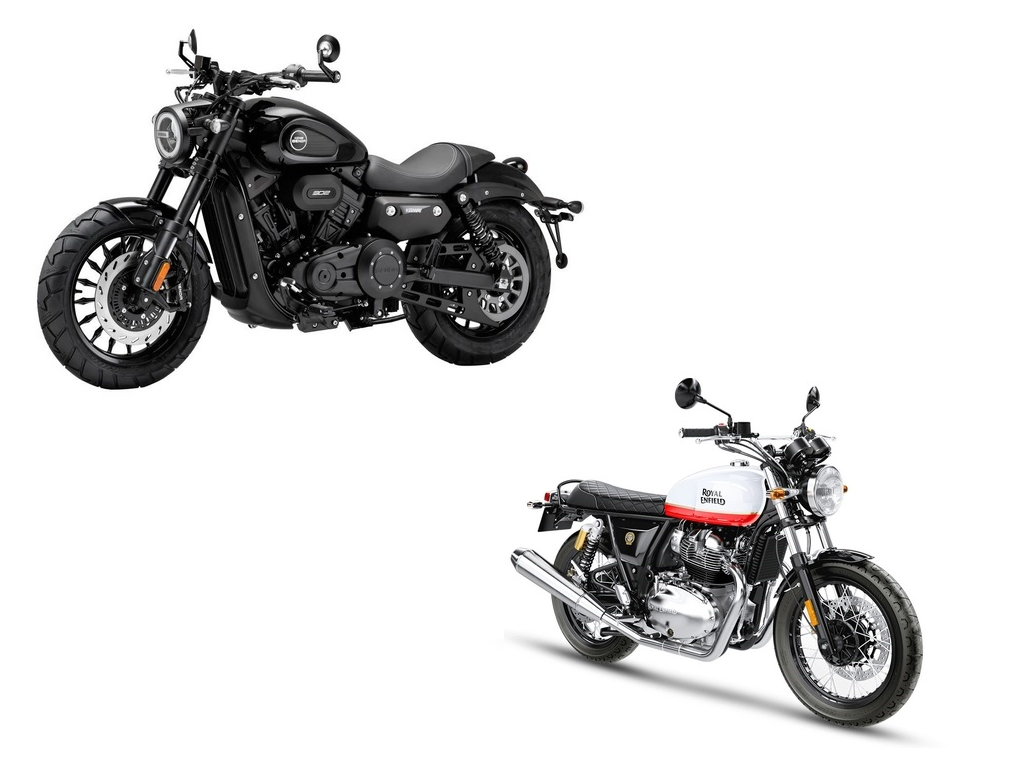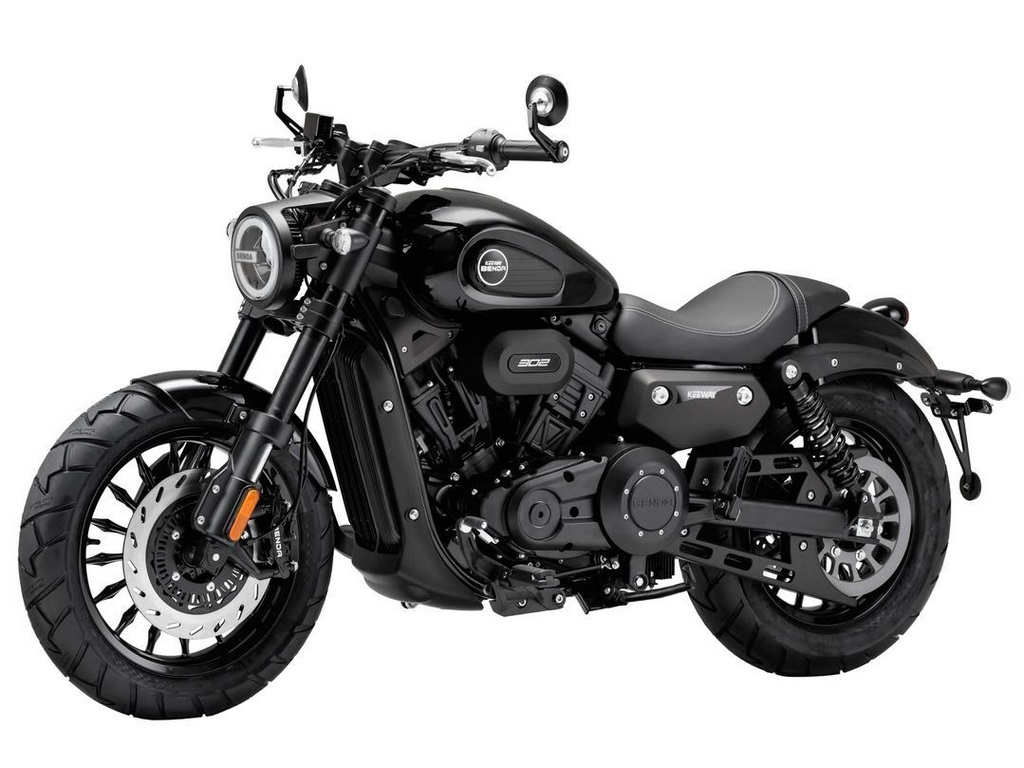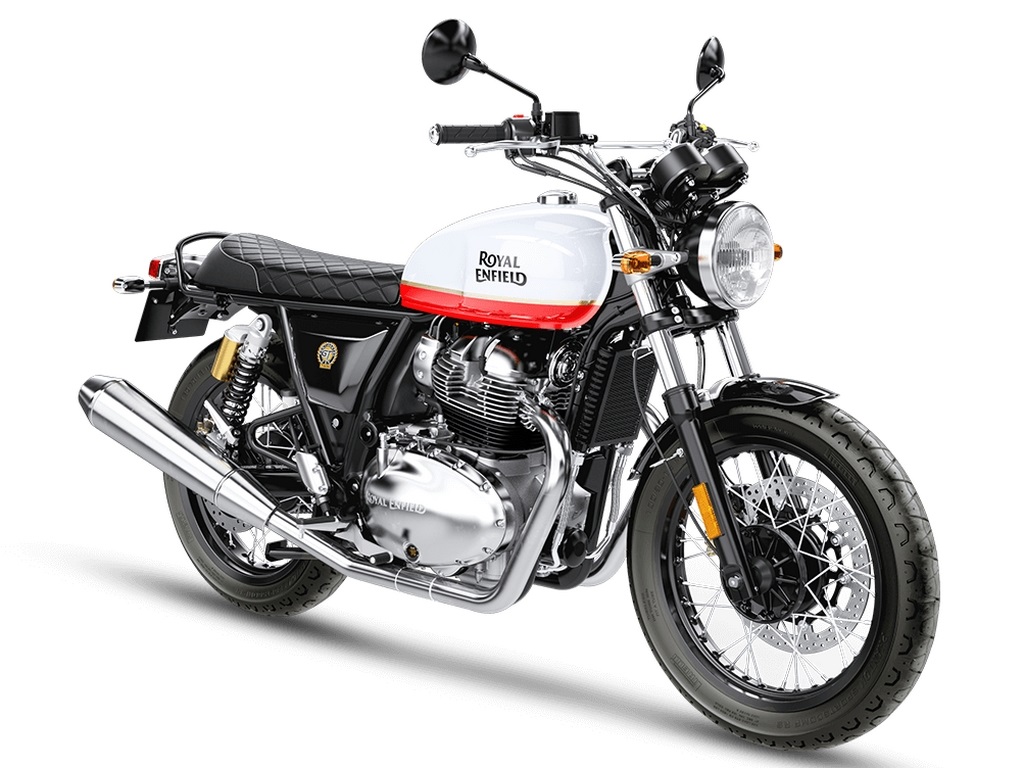Keeway V302C Vs Royal Enfield Interceptor 650 – Spec Comparo

Keeway V302C vs Royal Enfield Interceptor 650 spec comparo shows the competitiveness between the 2 motorcycles
Keeway V302C vs Royal Enfield Interceptor 650 spec comparo is here! All of sudden, Keeway India has launched the V302C cruiser. Royal Enfield 650 twins, which enjoyed a monopoly in the segment all these years, have got a competitor now.
While both the motorcycles are miles apart in many aspects like performance, price, and target customers, they have 1 thing in common: character. Both are lifestyle motorcycles invoking the joy of leisure riding.
| Specification | Keeway V302C | Royal Enfield Interceptor 650 |
|---|---|---|
| Base Price | Rs. 3.89 lakhs (ex-showroom) | Rs. 2.89 lakhs (ex-showroom) |
| Segment | Cruiser | Roadster |
| Engine | 298 cc V-twin 8-valve Liquid-cooled SOHC Unit | 648 cc Parallel-twin 8-valve Oil-cooled SOHC Unit |
| Bore x Stroke | 58 mm x 56.4 mm | 78 mm x 67.8 mm |
| Compression Ratio | 11.5:1 | 9.5:1 |
| Power | 29.5 HP at 8500 RPM | 47 HP at 7150 RPM |
| Torque | 26.5 Nm at 6500 RPM | 52 Nm at 5250 RPM |
| Gearbox | 6-speed Manual | 6-speed Manual |
| Slipper Clutch | Yes | Yes |
| Final Drive | Belt | Chain |
| Chassis | Double Cradle | Double Cradle |
| Front Suspension | USD Forks With 120 mm Travel | Telescopic Forks With 110 mm Travel |
| Rear Suspension | Coil Springs With 42 mm Travel | Coil Springs With 88 mm Travel |
| Kerb Weight | 167 kg | 202 kg |
| Seat Height | 690 mm | 804 mm |
| Ground Clearance | 158 mm | 174 mm |
| Wheelbase | 1420 mm | 1400 mm |
| Fuel Tank Capacity | 15 litres | 13.7 litres |
| Front Tyre Size | 120/80-R16 | 100/90-R18 |
| Rear Tyre Size | 150/80-R15 | 130/70-R18 |
| Alloy Wheels and Tubeless Tyres | Yes | No |
| Front Brake | 300 mm Single Disc | 320 mm Single Disc |
| Rear Brake | 240 mm Single Disc | 240 mm Single Disc |
| Dual Channel ABS | Yes | Yes |
| LED Lighting | All-round | Not Available |
| Instrument Cluster | Single Pod Digital With Tachometer | Twin Pod Analogue Digital With Tachometer |
| Gear Position Indicator | Yes | No |
Performance – Royal Enfield Interceptor 650 wins this aspect hands down thanks to the huge displacement advantage it has over the V302C. Moreover, both the bikes are mile apart in power and torque figures.
The Interceptor can clock speeds upwards of 170 km/hr while, unconfirmed reports say, the V302C can accelerate till about 140-150 km/hr. Both get a 6-speed manual transmission with a slipper clutch for effortless shifts.
Style – While V302C is a typical retro cruiser, Interceptor is a retro roadster. When it comes to style, the Keeway is way ahead with its Harley-like looks with Blacked-out elements, arrow-like alloy wheels, covered belt drive system, and tear drop tank.
Moreover, the fat USD forks, LED lights, sculpted seat, bulky tyres, and cool bar-end mirrors add to the overall charm. The Interceptor, on the other hand, looks straight out of the 60s with old-school equipment and chrome elements.
As Royal Enfield concentrated more on the powertrain, it cut cost everywhere else. But, those who love old school stuff will love the Interceptor’s design.
Character – Both the bikes get twin-cylinder engines. While the V302C gets a V-twin layout, the Interceptor features a parallel-twin configuration with 270 degree firing angle. So, both the bikes have a lot of character and a great sound track.
But, as both the engines are short strokes (Interceptor is extremely short stroke), they sound coarse as revs climb. Keeping the revs low will make riding both enjoyable.
Ease of use – The Keeway V302C easy takes the crown here thanks to its impeccable ergonomics and user-friendly design. The seat height is extremely low at 690 mm without compromising much on the ground clearance.

This aided by the low kerb weight of 167 kg makes the bike effortless to handle. The flat handlebar is as close as possible with the cluster offset towards the rider for maximum comfort while munching miles.
The Interceptor’s seat is not only narrow but also tall at 804 mm. Adding to this are the improper placement of the foot pegs and the heavy kerb weight that’s in the league of the superbikes.
So, unless and until the rider is tall and stout, handling the Interceptor would be quite difficult. Also, the jutted out twin exhausts need to take care of often in stop-go traffic. The presence of tubes inside the tyres also adds to the woes.
The chain drive on the Interceptor requires frequent maintenance and the lower capacity fuel tank with lesser fuel efficiency means more frequent trips to the fuel station. On the other hand, the V302C’s belt drive doesn’t require too much maintenance.
Rideability and Ride Quality – As both the bikes are short strokes, one can’t expect great rideability. Both the bikes would stall without adequate throttle inputs as per the selected gear. But, as Interceptor produces its maximum torque a little earlier, it would score better than the V302C.
As far as ride quality goes, the Keeway would come on top by a small margin thanks to its bigger side wall tyres and better suspension travel at the front. Its belt drive would be completely noiseless as well.
Interceptor’s rear suspension has better travel though. Also, there’s nothing much to talk about handling as both the bikes lack heavily in this regard. But, if at all we have to choose a better bike, the Interceptor would come on top.

Equipment – The Keeway effortlessly wins this area owing to the long list of equipment it has. It comes with LED lights, fully digital instrument cluster with gear position indicator, proper liquid cooling for the engine, fat USD forks upfront, and alloy wheels with tubeless tyres.
Most importantly it has the maintenance free belt drive system. The Interceptor 650 gets nothing of that sort. It’s a typical old-school bike with a strong powertrain. Both the bikes get dual-channel ABS as standard.
Reasons to buy – The greatest strength of Royal Enfield Interceptor 650 is its powerful 650 cc powertrain at an affordable price. But, buyers have to live with the other drawbacks mentioned in this article.
Those who are looking for unadulterated fun on an old-school architecture can very well get the Interceptor. The Royal Enfield also comes on top in brand image and serviceability. It has a great rider community as well.
The Keeway V302C, on the other hand, promises big on a small package. With the looks of a Harley along with fat forks and tyres, it oozes style everywhere. It’s V-twin motor has a great sound track and sounds amazing with a slip-on (we have heard it)!
Though it lacks the huge power and torque outputs of the Interceptor 650, it, anyway, won’t be used for 0-100 km/hr times and top speed runs. Out on the highway, it should be effortless to cruise at 100 km/hr with a better fuel economy and tank range as well.
So, it definitively comes on top in this spec comparo. But, you have to decide whether paying Rs. 1 lakh over the powerful Interceptor is a better decision or not. You can pour out your thoughts in the comment section!
The post Keeway V302C Vs Royal Enfield Interceptor 650 – Spec Comparo appeared first on MotorBeam.
Keeway V302C Vs Royal Enfield Interceptor 650 – Spec Comparo

Keeway V302C vs Royal Enfield Interceptor 650 spec comparo shows the competitiveness between the 2 motorcycles
Keeway V302C vs Royal Enfield Interceptor 650 spec comparo is here! All of sudden, Keeway India has launched the V302C cruiser. Royal Enfield 650 twins, which enjoyed a monopoly in the segment all these years, have got a competitor now.
While both the motorcycles are miles apart in many aspects like performance, price, and target customers, they have 1 thing in common: character. Both are lifestyle motorcycles invoking the joy of leisure riding.
| Specification | Keeway V302C | Royal Enfield Interceptor 650 |
|---|---|---|
| Base Price | Rs. 3.89 lakhs (ex-showroom) | Rs. 2.89 lakhs (ex-showroom) |
| Segment | Cruiser | Roadster |
| Engine | 298 cc V-twin 8-valve Liquid-cooled SOHC Unit | 648 cc Parallel-twin 8-valve Oil-cooled SOHC Unit |
| Bore x Stroke | 58 mm x 56.4 mm | 78 mm x 67.8 mm |
| Compression Ratio | 11.5:1 | 9.5:1 |
| Power | 29.5 HP at 8500 RPM | 47 HP at 7150 RPM |
| Torque | 26.5 Nm at 6500 RPM | 52 Nm at 5250 RPM |
| Gearbox | 6-speed Manual | 6-speed Manual |
| Slipper Clutch | Yes | Yes |
| Final Drive | Belt | Chain |
| Chassis | Double Cradle | Double Cradle |
| Front Suspension | USD Forks With 120 mm Travel | Telescopic Forks With 110 mm Travel |
| Rear Suspension | Coil Springs With 42 mm Travel | Coil Springs With 88 mm Travel |
| Kerb Weight | 167 kg | 202 kg |
| Seat Height | 690 mm | 804 mm |
| Ground Clearance | 158 mm | 174 mm |
| Wheelbase | 1420 mm | 1400 mm |
| Fuel Tank Capacity | 15 litres | 13.7 litres |
| Front Tyre Size | 120/80-R16 | 100/90-R18 |
| Rear Tyre Size | 150/80-R15 | 130/70-R18 |
| Alloy Wheels and Tubeless Tyres | Yes | No |
| Front Brake | 300 mm Single Disc | 320 mm Single Disc |
| Rear Brake | 240 mm Single Disc | 240 mm Single Disc |
| Dual Channel ABS | Yes | Yes |
| LED Lighting | All-round | Not Available |
| Instrument Cluster | Single Pod Digital With Tachometer | Twin Pod Analogue Digital With Tachometer |
| Gear Position Indicator | Yes | No |
Performance – Royal Enfield Interceptor 650 wins this aspect hands down thanks to the huge displacement advantage it has over the V302C. Moreover, both the bikes are mile apart in power and torque figures.
The Interceptor can clock speeds upwards of 170 km/hr while, unconfirmed reports say, the V302C can accelerate till about 140-150 km/hr. Both get a 6-speed manual transmission with a slipper clutch for effortless shifts.
Style – While V302C is a typical retro cruiser, Interceptor is a retro roadster. When it comes to style, the Keeway is way ahead with its Harley-like looks with Blacked-out elements, arrow-like alloy wheels, covered belt drive system, and tear drop tank.
Moreover, the fat USD forks, LED lights, sculpted seat, bulky tyres, and cool bar-end mirrors add to the overall charm. The Interceptor, on the other hand, looks straight out of the 60s with old-school equipment and chrome elements.
As Royal Enfield concentrated more on the powertrain, it cut cost everywhere else. But, those who love old school stuff will love the Interceptor’s design.
Character – Both the bikes get twin-cylinder engines. While the V302C gets a V-twin layout, the Interceptor features a parallel-twin configuration with 270 degree firing angle. So, both the bikes have a lot of character and a great sound track.
But, as both the engines are short strokes (Interceptor is extremely short stroke), they sound coarse as revs climb. Keeping the revs low will make riding both enjoyable.
Ease of use – The Keeway V302C easy takes the crown here thanks to its impeccable ergonomics and user-friendly design. The seat height is extremely low at 690 mm without compromising much on the ground clearance.

This aided by the low kerb weight of 167 kg makes the bike effortless to handle. The flat handlebar is as close as possible with the cluster offset towards the rider for maximum comfort while munching miles.
The Interceptor’s seat is not only narrow but also tall at 804 mm. Adding to this are the improper placement of the foot pegs and the heavy kerb weight that’s in the league of the superbikes.
So, unless and until the rider is tall and stout, handling the Interceptor would be quite difficult. Also, the jutted out twin exhausts need to take care of often in stop-go traffic. The presence of tubes inside the tyres also adds to the woes.
The chain drive on the Interceptor requires frequent maintenance and the lower capacity fuel tank with lesser fuel efficiency means more frequent trips to the fuel station. On the other hand, the V302C’s belt drive doesn’t require too much maintenance.
Rideability and Ride Quality – As both the bikes are short strokes, one can’t expect great rideability. Both the bikes would stall without adequate throttle inputs as per the selected gear. But, as Interceptor produces its maximum torque a little earlier, it would score better than the V302C.
As far as ride quality goes, the Keeway would come on top by a small margin thanks to its bigger side wall tyres and better suspension travel at the front. Its belt drive would be completely noiseless as well.
Interceptor’s rear suspension has better travel though. Also, there’s nothing much to talk about handling as both the bikes lack heavily in this regard. But, if at all we have to choose a better bike, the Interceptor would come on top.

Equipment – The Keeway effortlessly wins this area owing to the long list of equipment it has. It comes with LED lights, fully digital instrument cluster with gear position indicator, proper liquid cooling for the engine, fat USD forks upfront, and alloy wheels with tubeless tyres.
Most importantly it has the maintenance free belt drive system. The Interceptor 650 gets nothing of that sort. It’s a typical old-school bike with a strong powertrain. Both the bikes get dual-channel ABS as standard.
Reasons to buy – The greatest strength of Royal Enfield Interceptor 650 is its powerful 650 cc powertrain at an affordable price. But, buyers have to live with the other drawbacks mentioned in this article.
Those who are looking for unadulterated fun on an old-school architecture can very well get the Interceptor. The Royal Enfield also comes on top in brand image and serviceability. It has a great rider community as well.
The Keeway V302C, on the other hand, promises big on a small package. With the looks of a Harley along with fat forks and tyres, it oozes style everywhere. It’s V-twin motor has a great sound track and sounds amazing with a slip-on (we have heard it)!
Though it lacks the huge power and torque outputs of the Interceptor 650, it, anyway, won’t be used for 0-100 km/hr times and top speed runs. Out on the highway, it should be effortless to cruise at 100 km/hr with a better fuel economy and tank range as well.
So, it definitively comes on top in this spec comparo. But, you have to decide whether paying Rs. 1 lakh over the powerful Interceptor is a better decision or not. You can pour out your thoughts in the comment section!
The post Keeway V302C Vs Royal Enfield Interceptor 650 – Spec Comparo appeared first on MotorBeam.



